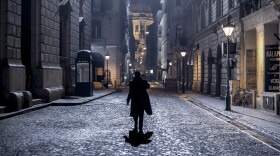It seems that every two or three years, Iranian filmmaker Asghar Farhadi puts out a masterpiece. Both A Separation and The Salesman won Oscars as Best Foreign Language Film. He's honored around the world, and so far he's figured out how to steer through the dangerous waters of the Iranian government. For his new film, though, Farhadi went to Spain, where he enlisted actors Penelope Cruz and Javier Bardem to play the leads in a film that's at various times a family drama, a mystery and a thriller — and it's good at all three.
Most of Farhadi's films start with a single situation and then slowly, events and details pile up. Everybody Knows begins with relatives arriving in a small town in Spanish wine country. A teenage daughter cavorts with a young man. They ride wildly on a motorbike, do some playful mischief in the medieval clock tower — and the girl, Irene, gets a slight hint that her mother Laura (Penelope Cruz) has a past, involving the old family friend Paco (Javier Bardem).
It’s almost shocking to see what Asghar Farhadi films in his first work outside Iran. In Iranian films, men and women never touch, the women wear headscarves and very conservative clothing, you never see the bed that even a married couple might sleep in. But in Everybody Knows the Iranian censorship wraps are off. Farhadi films an ecstatic wedding, like The Godfather but without the hovering menace of the Mafia life that dominates that celebration. Farhadi’s wedding guests dance and drink; they laugh — it feels unrestrained. The film's a riot of color, women's long hair and low-cut dresses. It's an explosion of cleavage. Men and women hold each other; they kiss, they stroke each other’s hair. The sensuality and physicality of the movie are wonderful. And until Laura suddenly discovers that her daughter Irene has been kidnapped, the film is joyful.
But for Asghar Farhadi, couples and families and societies are fragile, and they're often held together by conspiracies of silence. People agree — in silence — to keep secrets, but once that badly constructed order gets a knock, it falls apart. Laura's family holds a grudge about the vineyards that Paco bought cheap from Laura back when the land was undeveloped and Laura's family needed money. Laura moved to Argentina years ago, but why didn't her husband come for the wedding? Why hasn't he had a job for two years? Is he still drinking? Paco's wife has a sharp tongue, which no one appreciates, especially when she refuses to honor the family secrets.
Farhadi, of course, understands how his Iranian characters accumulate complications and grievances, but he also has a good handle on how such patterns might play out in the West. Here he doesn't look at social class and religious fundamentalism as he does in Iran, but he certainly gets it that families work in pretty much the same way all over the world. Resentment has the same bitter smell everywhere. And a parent's frantic worry about a child is the same in Spain as it is in Iran.
One real difference for Farhadi working in Spain is that the struggles in Everybody Knows play out amid gorgeous settings. His Iranian films take place in shabby neighborhoods or apartment buildings that are falling apart. But in Spain there's a big vineyard out behind the house; the homes radiate European farmhouse chic. The town has an open square where men and women drink coffee. People smile and laugh, and don't look like they're carrying huge moral burdens — at least at first.
In the West, money counts big. The kidnappers want a ransom. Land-rich Paco — apparently only a friend, not a parent — weighs the life of young Irene against the value of his estate. Some have said that Farhadi is repeating himself in this movie, but the terms are new and his eye for moral crises looks as sharp in Spain as in Tehran.






